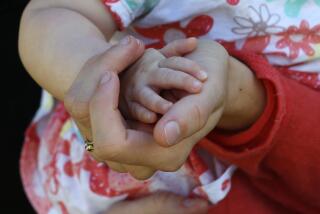Your Body : Parents May Need to Supplement Quality of Day-Care Center Menus
- Share via
Bobbie Seymour was looking forward to the mother-daughter luncheon at her daughter’s day-care center--until she saw the food. “The French fries were cold,” says Seymour, a Chino Hills mother who works as a clerk-typist. “The hamburger meat was gray. And I was hungry.
“Then I thought, maybe this is good compared to what they usually get.”
The working mother was so upset with the junk-food quality of day-care lunches that from then on, she carefully packed a nutritional lunch for her daughter to take to school.
That move makes good sense to a group of Texas researchers who just published disturbing news about day-care center menus in the Journal of the American Dietetic Assn.
In a survey of 40 licensed centers, they found menus often skimp on iron-rich foods and sufficient varieties of fruits. And the quantities of food often fell below government guidelines. For instance, the children should have gotten 50% to 66% of their total recommended daily calories, but they only received 44% on average.
Parents may compound the nutritional dilemmas after they pick up the famished child. “In response to their children’s hungry irritability, parents may allow snacks on the drive home that are convenient but high in fat and empty calories,” the researchers reported. By dinner, a child’s appetite is spoiled, along with the chance to compensate for the day long deficiencies.
Ironically, parents who pay the most for day care may have the most to worry about nutrition, child care experts say. “Some low-income children may be eating better than wealthier children because their day care centers are regulated by a state food program, which requires submission of menus and documentation of food purchases,” says Ken Jaffe of the International Child Resource Institute, a Berkeley-based clearinghouse.
Jaffe suggests that parents become more familiar with good nutrition themselves: “Ask to see a menu and have lunch at the center one day.”
Value of Sisterly Love
Staying on good terms with your sister won’t just win you points at the next family reunion. It might even spare you depression in your golden years.
In a recent Purdue University study, psychologist Vince Cicirelli found that men and women who maintain long-term, harmonious relationships with a sister are less likely to be depressed in later life.
The same benefit wasn’t evident in close bonds between brothers. Cicirelli isn’t sure why, but he suggests that, raised in an era of traditional sex-role conditioning, subjects may look more to women for nurturing and consequently developed closer relationships with their sisters.
In the study, Cicirelli interviewed 83 people--54 women and 29 men--ranging in age from 61 to 91 years. More than half were widowed; 39% were married; and 5% never married. Subjects first rated their feelings of closeness, rivalry and indifference, then took a standard depression test.
Squabbles between older siblings often reflect deeper problems, adds Irene Goldenberg, a UCLA family therapist: “If you’re still fighting with your sister at 73, it says something about your basic ability for conflict resolution.”
But it’s never too late to work out those conflicts. In therapy sessions, Goldenberg has witnessed older siblings iron out lifelong difficulties and reap the benefits. “Siblings are truly a rich resource for older people because they lose so many people.”
A New Measles Policy
For 30 years, children have needed a single measles vaccination. But in the wake of several virulent measles outbreaks, including one last year that sidelined USC star quarterback Rodney Peete and 37 other students, the American Academy of Pediatrics has just reversed its one-shot policy.
The academy now strongly recommends that all children should get a second shot. In cities where there have been measles outbreaks, all family members under age 32 also should get that second shot. (Explains an academy spokesman: Almost all people born before 1957 had measles and are therefore immune.)
The academy also proposes a new shot schedule, with the first measles vaccine to be given at age 15 months (or 12 months, if recurrent measles outbreaks have been reported locally); the second dose to be given before entering junior high or middle school.
But some doctors don’t think patients should wait that long for the second shot. “The ideal schedule is to get the first dose at 12 months and the second before kindergarten,” says Dr. James D. Cherry, a UCLA pediatrics professor who recommends vaccinations for anyone who never contracted measles, regardless of age. The Los Angeles County Department of Health Services offers free measles vaccinations for children. To find the nearest county health center, look in the white pages under “Government Offices,” suggests a health services spokeswoman.






